The country’s top court has sent a clear message: in cases loaded with commercial-scale narcotics, time spent in custody or delays in trial do not unlock the bail door unless the strict statutory checks under Section 37 of the NDPS Act are met—no shortcuts, no soft corners.
In a firm rebuke, the Supreme Court overturned two Bombay High Court orders that had allowed Vigin K Varghese out on bail in high-stakes cocaine and methamphetamine cases linked to major seizures probed by the Directorate of Revenue Intelligence. The judges didn’t mince words: the High Court skipped the mandatory legal threshold and leaned too heavily on sympathetic factors like long incarceration and anticipated trial delays.
A Container of Apples—or Something Much Sharper
The prosecution’s story reads like a transnational thriller:
– Over 50 kg of cocaine discovered in a refrigerated container from South Africa, cleverly hidden within boxes of green apples.
– An earlier seizure, days before, of nearly 200 kg of methamphetamine and additional cocaine, allegedly tied to the same network.
Investigators claim Varghese wasn’t a passive name on a company register but an active conductor—managing imports, liaising with international associates, and keeping the supply chain well-oiled.
Where the High Court Slipped
According to the Supreme Court, the High Court treated prolonged custody and predicted delay as if they were golden keys to bail. But Section 37 of the NDPS Act demands something far more exacting:
-
Reasonable grounds to believe the accused is not guilty.
-
Clear assurance that he won’t commit an offence while out on bail.
These are not decorative requirements—they’re statutory guardrails. And in this case, the High Court crossed them without addressing the prosecution’s core allegations or examining the incriminating circumstances that, in the Supreme Court’s view, couldn’t be ignored.
The Court’s Word: No Casual Findings in Serious Narcotics Cases
The judgment underscored that cases involving commercial quantities stand on a distinct legal pedestal. Regular bail considerations don’t automatically apply; the statute demands a deeper, evidence-linked inquiry. Relying on incarceration length without engaging with the record, the Court warned, risks stepping into the trial court’s territory.
What Happens Next
The bail orders are gone. The case has been sent back to the High Court, which must now reconsider the plea strictly under Section 37 and issue a reasoned order within four weeks.
Varghese remains on the same bail conditions for now—but only as a temporary arrangement. Any deviation gives the prosecution immediate grounds to snap the bail back.
The Supreme Court added that it was not expressing any view on guilt—just ensuring that the law’s toughest doors are not opened with the wrong keys.





